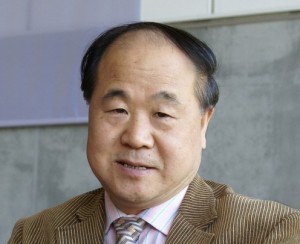October 24, 2012
What Mo Yan’s award means to China
Mo Yan in Hamburg, 2008. Photo: Johannes Kolfhaus. Creative Commons.
Li Changchun, chief propagandist for the CCP, congratulated this year’s Nobel laureate in Literature, Mo Yan, with high spirits: “(This award) reflects the prosperity and progress of Chinese literature, as well as the increasing influence of China.” It’s difficult to understand what the politician means by “the increasing influence of China.” It couldn’t mean that China put pressure on the committee, but it does show the Chinese authority’s self-confidence and their way of interpreting their citizen’s international fame.
Two years ago, when Liu Xiaobo was awarded the Nobel Peace Prize, the Chinese government was outraged and criticized the award as a desecration of the Nobel tradition. Since this year’s winner Mo Yan is a CCP member and vice president of the Writers’ Association, we can suppose that the reputation of the Nobel Committee might be “rehabilitated” in the eyes of the Chinese officials. This “Nobel complex,” as The New Yorker refers to it, seems healed. Mo Yan has said he hopes for the release of his Nobel colleague Liu Xiaobo, who could not go to Oslo in 2010 to receive the Peace Prize because of his crime of “inciting subversion of state power.” Liu’s eleven-year sentence will keep him in jail until 2020.
The 55 year-old Mo Yan is a prolific writer. His early writings during the 80s and 90s, including “Touming de hong luobo” (“A Transparent Carrot,”) “Baigou qiuqianjia” (“White Dog and the Swing,”) and “Kuhe” (“Dry River”) are lyrical and literarily “down to earth.” These poems and short stories are strongly rooted to nature and the landscape of his hometown – Gaomi in Shandong province.
Mo Yan’s childhood was accompanied by hunger. He was so traumatized by the 1959 famine that his utmost wish as child was to have three meals a day and to eat as much as he wanted. When he was 11 years old the Cultural Revolution broke out; Shandong was one of the bloodiest battlefields of the Red Guards. Different groups declared that they were the truly authentic representatives of Mao Zedong’s ideas. The civil war led to fights among armed groups that cost many human lives and left incurable scars on Chinese society. Mo Yan joined the army in 1976 and served for many years. Hunger and violence are prominent in his writing.

